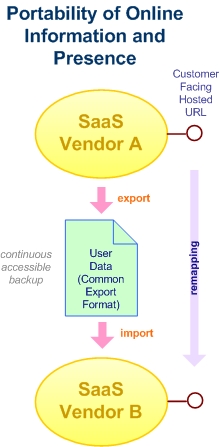Information portability, trust, and an Online Software 'Bill of Rights'

The online social software services like del.icio.us let us do a remarkable thing. They create another good reason to store our data online for all to share. I can't tell you how many times I've made terrific discoveries because of del.icio.us/popular or Blinklist. And then added those discoveries to my own bookmarks, further increasing the public pool of knowledge. These relevance engines really do make excellent use of the data that we publicly conglomerate on these types of sites. The point here is that the value of software and data online is often much greater than the value of software and information offline.
Like most contracts, people sign them hoping for the better when they really exist for the worst case scenarios. But like Richard MacManus is with Web Office, my worry is for the portability and safety of our online information in general. Because that's where most of us will be spending ever more of our time in the future: With increasingly Web-based and otherwise highly connected software.
The real problem is that we're all trapped in an online version of A Streetcar Named Desire (starring in this case Web 2.0 software sites and Software as a Service.) As in, we're all at the mercy of the kindness of strangers. And it's time to take a hard look at what we should do about it, if anything.
Unfortunately, the ugly truth could very well be that online software services would love nothing more than to keep us captive and make sure it's difficult to leave their good graces. Fortunately, a little digging on a few of the newer social sites shows that generally isn't the case, at least with the more well known services. Del.icio.us has a terrific export page that allows you to simply and easily dump all your stored bookmarks into a standard bookmark file. As for Flickr, there is the popular Flickr Backup program that allows you to batch download all the photographs you've ever stored online.
Interestingly, Flickr Backup notes that it's a terrific utility if your own hard drive goes bad or you lose your original copies of your photos. And that shines a light on a very important point: Although many of us are still more comfortable managing our software and data locally on our personal computers, it's a lot more risky to do that than it is to leave it with a professionally hosted datacenter with RAID network attached storage, battery rooms, and off-site backup.
Now, I agree that still leaves us vulnerable to inadvertent format lock-in and failures from non-technical sources. In fact, I'll go as far as to say that many of us are very unsophisticated consumers of online software and don't worry about such issues. I'll even go a step further and say that many of us are probably OK with losing a bit of our online data through accidence or circumstance.
But of course, that's not how successful businesses are run, nor can they afford such disruption for very long. The vital business information in an enterprise is its lifeblood and it's accessibility and safety can make or break them. Here I invoke the recent salesforce.com outages as an infamous example that hopefully won't be repeated any time soon.
To come full cricle, we're putting the cart before the horse when we put too much hope into the good intentions and abilities of others that we don't know and whose abilities we may be no useful judge of. I would go as far as to say that the good Web 2.0 online software user or grizzled SaaS veteran must be the cynical, hard-bitten user; ready for the worst. They should be the ones that know that things will go wrong and insist that their supplier's products be structured to put them at little risk.

What I believe we need is something like an Online Software Bill of Rights. A simple, straightfoward statement that says that a user's data and hosting is always theirs and ready for the taking. This includes things you might not initially think of including permalinks to the data and the ability to reroute them even when a service has failed. Perhaps hard to do and not generally available from providers at the moment. But can you bet your business or your personal records on anything less? At the very least, you should be aware if a service cannot support such capabilities. Like most contracts, people sign them hoping for the better when they really exist for the worst case scenarios.
Fortunately, simple, useful workhorse data formats like RSS and OPML are already available to do a lot of the hard work of backup and format transparency, now it's just up to us to ask.
In any case, here's what such a list of rights might look like, based on a recently proposed blogger's Bill of Rights.
Online Software Bill of Rights
- Data should be easy to move between online applications. Common export formats should be preferred, but RSS, OPML, Atom, and (if necessary) well-documented XML should be used when no such accepted formats exist.
- Central storage of data that is not likely to go offline. I've been a proponent of 3rd party hosted services for a while now. Online vendors should let users supply their own online storage providers where possible as capacity and performance continues to improve. In addition to the provider's original copy that is.
- Data backups should be automatic and accessible online without intermediaries. This might seem tough but will probably seem routine in a few years. And it's the right thing to do. Heck, this is practically happening automatically today in a crude form with the Wayback Machine. Let's make it formal.
- Hosting points must be remappable even during an outage. There is nothing more galling or frustrating than having your online software, and consequently your business, offline and being able to do nothing about it. Users should be able to remap their services and data to new hosting points, again without intervention.
Note: Thanks to Dave Winer (here and here) as well as some e-mails that have passed back and forth on the Web 2.0 Workgroup.
Nicholas Carr also made some intriguing points today on the SaaS topic and which direction the industry is moving. Anecdotally the story is promising but not conclusive. But, while I'm sanguine that the online software story is compelling in the large and for the long term, especially as economies of scale kick in, whatever you do, don't let the kindess of strangers lull you into complacency.
What's holding you back from using online software? You know it's better for you. But is it too risky?